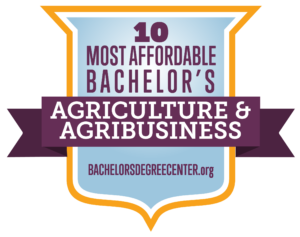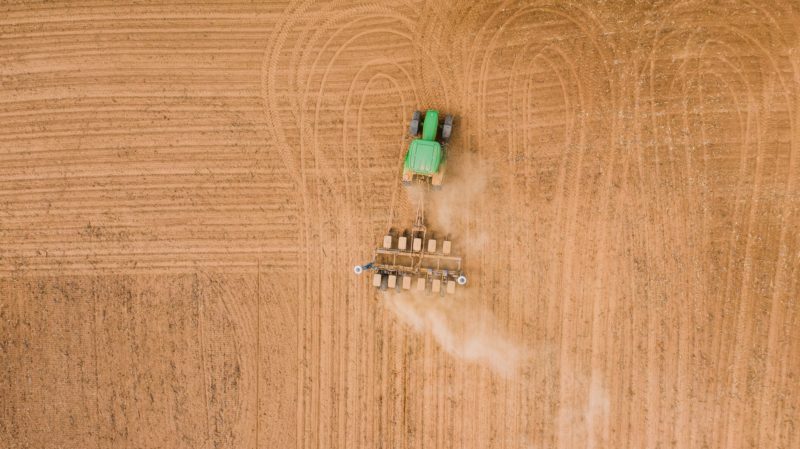
Key Information:
- Purdue University is the #1 school for an affordable agriculture and agribusiness bachelor’s degree.
- Agriculture and Agribusiness bachelor’s offer a variety of specializations including farm management, plant science, agricultural biotechnology, and more.
- Courses are designed to blend practical skills with theoretical knowledge. Many programs also include opportunities for internships and field experience, enhancing learning and employability.
Finding an affordable agriculture degree, or degree in agribusiness, can be challenging with the cost of college today, but Bachelor’s Degree Center knows your needs. Since agriculture students are usually from rural areas, and may well be the first person in their family to go to college, cost has to be a consideration. You may be paying your own way, using savings or working, but you can get your bachelor’s in agriculture without burying yourself in debt.
The programs we’ve ranked come from some of the most respected agriculture schools in the world, but that doesn’t meant they’re unaffordable. In fact, public state universities and small regional universities are the backbone of agricultural education, and they work to keep their tuition low. There’s probably an affordable option right in your home state.
Methodology: Ranking the Most Affordable Agriculture Degree Programs
Bachelor’s Degree Center has ranked the most affordable agriculture degrees by their tuition cost, but that’s not the only important factor. BDC editors feature only accredited, reputable institutions so students will know their degree is worth their while.
1. Purdue University

The Agriculture program at Purdue University is ranked #12 in the world and offers over 30 concentrations in the field of agriculture. Students are offered the opportunity to major in areas of agriculture that include farm management, biochemistry, plant science, insect biology, soil and water sciences, and more. The affordable agriculture degree program also features 54 different educational options, the opportunity to study abroad and engage in research. Graduates from the program can find employment opportunities in a wide range of fields working directly in agriculture or in areas that are related to agriculture.
Purdue University is a public university in Indiana and is the flagship school in the Purdue University system. The school offers over 200 undergraduate major programs, over 70 master’s and doctoral degree programs, and professional degrees in veterinary medicine and pharmacy. The Carnegie Research Classification for Purdue University is “R1: Doctoral Universities — Very high research activity. Many students who graduated from Purdue University have gone on to win major awards.
What We Like: Purdue features a sea-grant and space-grant affiliation.
Degree: Multiple Majors
Agriculture at Purdue University
2. North Carolina State University

The College of Agriculture and Life Sciences at North Carolina State University offers multiple academic programs along with research and extension services that teach students how to handle the challenges posed by the field of agriculture. The departments at the school include animal and ecological systems, food, biochemical and engineered systems, human and resource systems, and plant, insect, microbe and soil systems. Students can select the major that appeals to them the most as a career in any one of the departments and take advantage of internship opportunities to practice what they learn.
North Carolina State University (NCSU, NC State or State) is part of the North Carolina public university system and is the largest campus in the Carolinas. The school has a sea-grant and space-grant affiliation, and has a Carnegie Research Classification of “R1: Doctoral Universities — Very high research activity”. The school offers 106 bachelor’s degrees, 104 master’s degrees, 61 doctoral degrees, and a Doctor of Veterinary Medicine.
What We Like: NCSU is part of the Research Triangle.
Degree: Multiple Majors
College of Agriculture and Life Sciences at North Carolina State University
3. Iowa State University

The College of Agriculture and Life Sciences at Iowa State University offers almost 30 major concentrations that include genetics, horticulture, animal science, seed science, culinary food science, and more. The agricultural concentrations focus on business, technology, society, exploration, and agronomy for the production of crops, the business of agriculture, agricultural laws, and the buying and selling of agricultural commodities. All concentrations have a specific focus, but the studies option allows students to customize their educational track and select an area of emphasis to make into their major.
Iowa State University (Iowa State) is a public university and is the largest in the state of Iowa. It’s a public land-grant flagship research university and has a space-grant affiliation. The Carnegie Research Classification gives the school an “R1: Doctoral Universities — Very high research activity”. The school’s sports teams participate in the NCAA Division I — Big 12 conference.
What We Like: The school offers 100 bachelor’s degrees, 112 master’s, and 83 doctoral degree programs. It also has a professional degree program in veterinary medicine.
Degree: Multiple Majors
College of Agriculture and Life Sciences at Iowa State University
4. Oklahoma State University

Ferguson College of Agriculture at Oklahoma State University offers 16 majors and over 50 study options for students seeking a career in agriculture. The college also offers pre-professional programs that act as statements of intention so a student can indicate a career goal while working on getting a bachelor’s degree. Degree tracks range from animal husbandry, food processing, environmental sciences, ranch operations, horticulture, and more. Some programs have a five-year plan, but an accelerated program that allows students to finish in four years is available.
Oklahoma State University (OSU) is the flagship university in the OSU System and is also a land-grant research university. The school has a Carnegie Research Classification of “R1: Doctoral Universities: Very high research activity” and has a space-grant and sun-grant national participant affiliations. OSU offers bachelor’s, master’s, and doctoral degree programs across six colleges.
What We Like: The school’s sports teams participate in the NCAA Division I — Big 12 conference.
Degree: Multiple Majors
Ferguson College of Agriculture at Oklahoma State University
5. North Dakota State University

The College of Agriculture, Food Systems, and Natural Resources at North Dakota State University offers over 20 majors in agricultural concentrations. Programs include agricultural and biosystems engineering, general agriculture, equine science, veterinary technology, agricultural economics and more. The college offers students the opportunity to learn from world-class scientists in state-of-the-art facilities for hands-on learning experiences that enhance what’s learned in the classroom. Curriculums focus on teaching students how to be competitive in a global economy and have the capability to use the latest technology while learning how to embrace the ever-changing world of agriculture.
North Dakota State University (NDSU) is a public university and is part of the North Dakota University System. Its Carnegie Research Classification is “R2: Doctoral Universities — High research activity”. The school offers 94 bachelor degree majors, 84 undergraduate minors, 87 master’s degrees, 52 doctoral degrees, and 21 graduate certificate programs. Athletic teams at NDSU participate in the NCAA Division 1 — Big 12 conference.
What We Like: NDSU is a land-grant university that was originally founded as an agricultural college.
Degree: Multiple Majors
College of Agriculture, Food Systems, and Natural Resources at North Dakota State University
6. University of Florida

The College of Agricultural and Life Sciences at University of Florida offers multiple agricultural majors for students who are interested in bringing the future to the field of farming and ranching. Some of the affordable agriculture degree concentration programs include botany, agricultural education and communication, dietetics, food science, food and resource economics and more. Most of the degree programs teach students learn how to apply modern technology to improve the field of food production and management.
University of Florida (UF) is a public university and is part of the State University System of Florida. The school has a Carnegie Research Classification of “R1: Doctoral Universities — Very high research activity” and has a sea-grant and space-grant affiliation. It offers graduate professional programs, 103 bachelor’s degree programs, 123 master’s degrees, and 76 doctoral degree programs. The school’s athletics teams participate in the NCAA Division I FBS — SEC conference.
What We Like: The school also offers pre-professional studies for students who want to earn an advanced degree in the field of agriculture.
Degree: Multiple Majors
College of Agricultural and Life Sciences at University of Florida
7. University of Georgia

The College of Agricultural and Environmental Sciences at the University of Georgia offers over 20 degree programs in the agricultural sciences. Students have the option to enter into undergraduate programs that include avian biology, applied biotechnology, dairy science, animal health, poultry science, water and soil resources, and more. Students can also take minors that complement their major. The school also offers preprofessional study programs. Most programs offer the opportunity for hands-on learning in and out of the classroom and participate in research programs to further the science of agriculture.
UGA features a sea-grant, space-grant, and sun-grant affiliations, and has a Carnegie Research Classification of “R1: Doctoral Universities — Very high research activity”. Students can engage in bachelor’s, master’s, and doctoral degree programs at UGA. The school’s sports teams participate in the NCAA Division I FBS — SEC conference.
What We Like: The University of Georgia (UGA) is one of the oldest public universities in the U.S. and is the flagship campus for the University System of Georgia.
Degree: Multiple Majors
College of Agricultural and Environmental Sciences at the University of Georgia
8. Michigan State University

The College of Agriculture and Natural Resources at Michigan State University offers 20 different undergraduate majors and minors in the field of agriculture. Many of the programs offer students the opportunity to apply their education on campus, in the state of Michigan, and around the world. Some of the undergraduate majors include agribusiness management, entomology, crop and soil sciences, animal science, and more.
Michigan State University (MSU) is the flagship campus of the public university system. It’s a land-grant research university with a sea-grant and space-grant affiliation, and has a Carnegie Research Classification of “R1: Doctoral Universities — Very high research activity”. The school offers bachelor’s, master’s, and doctorate programs. The school’s athletic teams compete in the NCAA Division I — Big Ten Conference.
What We Like: Students have the option to take one degree track and take classes from another degree track offered by the college as their minor.
Degree: Multiple Majors
College of Agriculture and Natural Resources at Michigan State University
9. Louisiana State University-Baton Rouge

The Agricultural Business degree program at Louisiana State University — Baton Rouge trains students to enter into a wide variety of careers found in agriculture. The affordable agriculture degree program is designed to bring agriculture and business into one degree program and teach students how to bring together the economic side of agriculture with the discipline and framework of operating a business. The major offers four concentrations that include: agribusiness finance, food industry management, international business, and rural development. These concentrations are educational pathways into careers for private and public roles.
Louisiana State University (LSU) is the flagship campus of the public university system of Louisiana. The school is a public land-grant research university and has a Carnegie Research Classification of “R1: Doctoral universities — Very high research activity” and has a sea-grant and space-grant affiliation. The school’s sports team compete in the NCAA Division I FBS — SEC conference.
What We Like: LSU sponsors around 800 research projects each academic year.
Degree: Agricultural Business
Agricultural Business degree program at Louisiana State University
10. University of Arkansas

The Agricultural Program at the University of Arkansas is housed in the Dale Bumpers College of Agricultural, Food and Life Sciences. It features 14 majors that include poultry science, food science, human nutrition and dietetics, animal science, and more. Students also have 24 minors to choose from in addition to their major. The college prepares graduates for work in their respective major, but also prepares them to work in fields that include veterinary, dental, legal, and medical fields. Students get the opportunity to learn through experience in hands-on labs, leadership development, and internships.
The University of Arkansas (U of A, UA, or UArk) is a public flagship research university with a land-grant and a space-grant affiliation. The school offers over 200 majors for bachelor’s, master’s, and doctoral students. The Carnegie Research Classification for U of A is “R1: Doctoral Universities — Very high research activity”.
What We Like: The school enrolls over 27,000 students each semester and maintains a ratio of 19 students to each faculty member.
Degree: Multiple Majors
Agricultural Program at the University of Arkansas
How Do I Save Money on an Agriculture Degree?
An affordable agriculture degree can be found, but you have to have a good strategy. If there is a junior college in your town, you could live at home and go there for two years to get your core courses. This would save a tremendous amount of money, To get an affordable agriculture degree, attend a state university in the state you live in. Out-of-state tuition is much higher.
Another piece of strategy is to go to the school with “state” in the name. This would mean picking Iowa State over the University of Iowa, for example. Both are state institutions, but the one with “state” in the name is generally cheaper by design. The ones with “state” in the name usually also have better agriculture departments. This is true, for example, at Oklahoma State University, as opposed to the University of Oklahoma.
What Can I Do With an Agriculture Degree?
While farming is often the first thing that comes to mind, there are several career pathways in agriculture. Anything related to the health and growth of plants or animals is agriculture. The best careers in agriculture may not relate to farming at all. You could become a bio-chemist, or own a business selling farm equipment, which would probably make more profit than a farm. The best careers in agriculture may relate to farming or may not. Many people who grew up on a farm get an agriculture degree and go back to improve their farm.
Jobs you can get with an agriculture degree are limited only by your imagination. To answer, what can I do with an agriculture degree, basically anything you want. What jobs can you get with an agriculture degree could depend on some of the classes you take. There are different concentrations even in the agriculture major.
You could be a farmer or a farm manager with an agriculture degree. A county extension agent, who helps farmers solve problems is another option.
Some other careers include:
- Water resource specialist
- Environmental engineer
- Agriculture engineer
- Food scientist
- Wildlife biologist
Are There Scholarships for Agriculture?
Maybe it is because so many areas related to agriculture, but there are many scholarships for agriculture students. It is a good idea to research to find that scholarship for agriculture student well before college starts, maybe in your junior year of high school. There are scholarships for female agriculture students as well.
There are agriculture scholarships for high school seniors who are getting ready for college.
According to a story in USNews, there are plenty of scholarships for agriculture majors. Agriculture is a lot more than farming, and that may be why agriculture scholarships for college students appear readily available. Agriculture relates to all the food we eat, so that may be a reason people are interested in funding scholarships.
There are foundations that fund agriculture scholarships for women. There are also some for minorities.
Scholarships for women in agriculture are just one way of opening up the field to more people. You might also check for scholarships for any groups you or your family might belong to. There are times when scholarships are not awarded because there were no applicants.
There are some scholarships that are very large and will pay most of your expenses. There are, however, a lot of smaller scholarships — for $500, $1,000, and so forth. The Daughters of American Agriculture Scholarships offers a $1,000 award. The National Potato Council offers a $5,000 scholarship. State wheat, corn, cotton associations also often award small scholarships. It is a good idea to apply for a lot of them, and hopefully, you will get a few. You may search online for scholarships and look around you. Sometimes local organizations have smaller scholarships of $1,000 or less, but those will add up if you get a few.
There are also government programs, such as the USDA scholarship program which is a renewable $5,000 scholarship that could offer even more. There are some private foundation scholarships, such as the Saul Wilson Scholarship which awards $10,000 for a few students each year. When looking for scholarships make sure you are applying for a scholarship and not a loan.
Related Rankings:
25 Best Bachelor’s in Agriculture and Agribusiness
15 Best Online Bachelor’s in Agriculture and Agribusiness
10 Fastest Online Bachelor’s in Agriculture and Agribusiness
